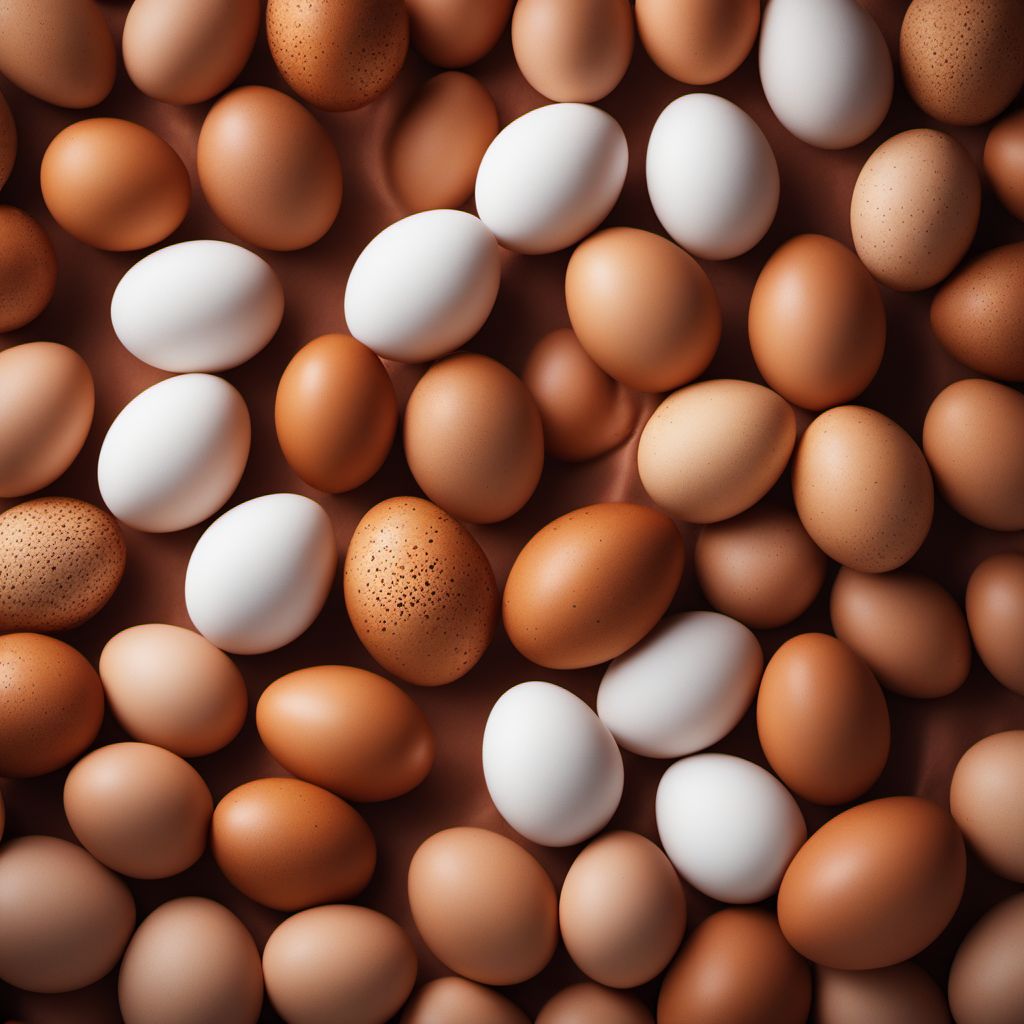
Ingredient
Eggs from other eggs producer birds
"Beyond the Chicken Coop: Exploring the World of Exotic Egg Producers"
Eggs from other eggs producer birds, such as ducks, geese, quails, and ostriches, vary in size, color, and shell thickness. Duck eggs, for example, have a richer yolk and a slightly gamier flavor compared to chicken eggs. Geese eggs are larger and have a higher yolk-to-white ratio, resulting in a creamier texture. Quail eggs are petite and delicate, with a mild flavor. Ostrich eggs, on the other hand, are enormous and can yield the equivalent of 24 chicken eggs. These eggs are prized for their unique characteristics and are often sought after by adventurous cooks and food enthusiasts.
Origins and history
The consumption of eggs from other eggs producer birds dates back centuries and varies across cultures. Duck eggs have been enjoyed in Asian cuisines for centuries, while goose eggs have a long history in European cooking. Quail eggs have been a delicacy in many cultures, particularly in Asian and Mediterranean cuisines. Ostrich eggs have been consumed by indigenous tribes in Africa for thousands of years. Today, these eggs are not only cherished for their culinary value but also for their cultural significance and historical roots.
Nutritional information
These eggs are packed with essential nutrients, including high-quality protein, vitamins (such as vitamin A, D, and B12), minerals (such as iron and selenium), and healthy fats. They are also lower in cholesterol compared to chicken eggs.
Allergens
Eggs from other eggs producer birds may cause allergies in individuals who are allergic to chicken eggs. It is important to exercise caution and consult with a healthcare professional if you have any known egg allergies.
How to select
When selecting eggs from other eggs producer birds, look for eggs that are clean, uncracked, and have intact shells. The shells should be smooth and free from any discoloration or unusual odors. If possible, choose eggs that are sourced from reputable producers who prioritize the welfare and health of their birds.
Storage recommendations
Eggs from other eggs producer birds should be stored in the refrigerator, ideally at a temperature between 35-40°F (1-4°C). It is best to store them with the pointed end facing downwards to help maintain their freshness. These eggs can be stored for up to 4-6 weeks, but it is recommended to use them as soon as possible for the best flavor and quality.
How to produce
While producing eggs from other eggs producer birds may require specialized knowledge and resources, individuals with suitable space and resources can consider raising ducks, geese, quails, or ostriches to obtain these unique eggs. It is important to research and understand the specific requirements and regulations for each bird species before embarking on such a venture.
Preparation tips
When using eggs from other eggs producer birds, they can be used in a similar manner to chicken eggs in most recipes. However, it is important to note that their larger size or different flavor profile may require slight adjustments in cooking times or ingredient ratios. Duck eggs, for example, are excellent for baking due to their higher fat content, resulting in moist and rich baked goods. Quail eggs are often enjoyed boiled or used as a garnish in salads or appetizers. Experimenting with these eggs can lead to exciting and unique culinary creations.
Substitutions
N/A (As eggs from other eggs producer birds have distinct characteristics, there are no direct substitutions that can replicate their unique flavors and textures.)
Culinary uses
Eggs from other eggs producer birds are versatile and can be used in a variety of culinary applications. They can be scrambled, fried, poached, boiled, or used in baking, adding a distinct flavor and texture to dishes. They are particularly popular in Asian cuisines, where they are used in dishes like salted duck egg custard, century eggs, or balut. These eggs can also be used to enhance the richness of pastries, custards, and ice creams.
Availability
Eggs from other eggs producer birds are commonly available in regions where these birds are raised or where there is a demand for specialty ingredients. They can often be found in specialty grocery stores, farmers markets, or online retailers that cater to culinary enthusiasts.
More ingredients from this category

Emu eggs
The Majestic Emu Egg

Ostrich eggs
The Majestic Marvel: Discovering the Wonders of Ostrich Eggs

Nandu eggs
The Exotic Gem: Nandu Eggs

Turkey eggs
"The Hidden Gems: Exploring the Unique Delights of Turkey Eggs"

Eggs from other not listed eggs producer birds
Exotic Eggs: A World of Avian Delights

Seagull eggs
"Nature's Coastal Delicacy: Exploring the Unique Flavors of Seagull Eggs"